

Exciting Opportunity: Apply for the 2024 PhD in Sustainable Development and Climate Change!
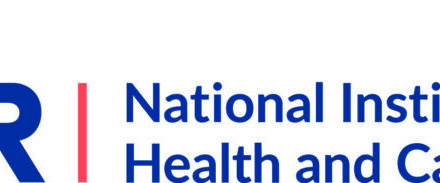
NIHR INSIGHT Research Masters Studentships for September 2024: Applications Open
Free digital skills training opportunity with refushe - august 2024 intake (for kenyans), leading change fellowship, yuwaah-unicef fellowship: become one of the 30 climate champions of young india.

APPLY TO ATTEND: Make Your Mark - A McKinsey Pre-MBA Mentorship Programme
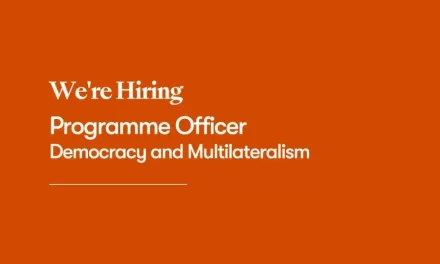
Programme Officer Opportunity: Democracy and Multilateralism at Kofi Annan Foundation
Alf euro-mediterranean young professionals programme.

Calling All Climate Adaptation Enthusiasts: Apply for the Associate Programme Officer Job
Traineeship opportunities at eurojust.
- Internships
The Salzburg Global Center for Education Transformation Writing Residency
Scicomm in practice fellowship.

Call for Applications - Young Founders Programme Autumn 2024(Fully-funded)
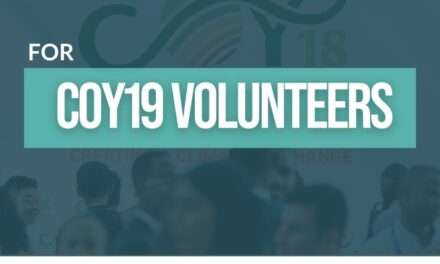
COY19 - Volunteer Application Form
Youth action day - summit of the future youth participation application(funding available and open to all nationalities), apply now to become a delegate for rcoy apac 2024(funding available and open to asia-pacific region youth).

Regional Youth Parliament on Climate Action (RYPCA) Interest Form

Unlocking the Female Economy: Join the Financial Alliance for Women Hackathon 2024

Call for Applications - Capacity Strengthening Training on Transitional Justice & Reconciliation and the African Union Transitional Justice Policy (AUTJP)

Exciting News: Call for Applications for Intermediate Level E-mobility Training!
Announcing the 2024-2025 ontario community changemakers program, 2024 bolt grant program: empowering innovation for global internet access (grants of up to usd $300,000).
- PROPOSAL WRITING
- TIPS FOR UN JOBS
- AUSTRALIA & OCEANIA
- ADVERTISE WITH US
- POST EVENT / OPPORTUNITIES
- Privacy Policy
Select Page
Join IHRB as a Junior Researcher for Just Transitions (Paid Remote Opportunity for All Nationalities)
Posted by admin | Jun 29, 2024 | Africa , America , Asia , Australia and Oceania , Continent , Europe , Jobs , Latin America and the Caribbean , Middle East and North Africa , South America | 0 |
The Institute for Human Rights and Business (IHRB) is excited to announce a new six-monthly paid work experience programme, and we’re looking for a dynamic junior researcher to join our Just Transitions projects.
Role Overview
As a Just Transitions Junior Researcher, you’ll play a crucial role in supporting multi-year policy-influencing and ecosystem-building research projects. This role involves a mix of administrative and research tasks across various projects, ideal for someone with strong research skills, attention to detail, multitasking abilities, and the capability to work autonomously in a remote environment. We seek a candidate passionate about advancing human rights and climate justice, demonstrating a willingness to learn, adaptability, and a positive approach to problem-solving.
Founded in 2009, IHRB aims to achieve a more just, regenerative global economy where:
- Workers and communities can effectively ensure their rights are respected.
- Businesses respect the rights of workers and communities and the natural systems they depend on.
- Financial actors positively impact their partners’ human rights and environmental responsibilities.
- Governments implement incentives that drive rights-respecting and planet-aligned businesses.
Our mission is to integrate respect for people and the planet into everyday business through human rights-based research, targeted convening, and collaborative action with various stakeholders.
Just Transition Programme
The Just Transitions programme aims to enhance understanding of just transitions through research and effective approaches for integrating the voices of those impacted by climate policies. Our foundational report, “Just Transitions for All: Business, Human Rights, and Climate Action,” outlines the benefits of considering the rights of workers, communities, and consumers in climate transitions. We provide guidance on safeguarding the “just” in just transitions to prevent co-option and confusion as the concept gains popularity.
Key Projects
- The Cost of Green Conflict : Assessing the costs to renewable energy companies when failing to maintain their social license to operate.
- Just Stories : Highlighting narratives that illustrate the benefits of meaningful engagement in the net-zero agenda.
- Just Energy Transition Partnerships (JETP) : Analyzing the human rights risks and social opportunities in countries like South Africa, Indonesia, and Senegal.
- Just Transitions Finance : Elevating understanding of the financial system’s role in promoting rights-respecting transitions.
Position Details
- Start Date : Ideally August 2024
- Hours : Full-time (37.5 hours/week) or part-time (30 hours/week) for the right candidate
- Duration : 6 months (fixed term)
- Location : Remote, within 1-2 hours of GMT timezone. Must have permission to work in your location and access to good internet connectivity.
- Pay : £1,725 per month (full-time), pro-rata for part-time. Compensation based on a London benchmark.
- Contract : Consultancy agreement under UK law.
Responsibilities
- Conduct desk research and literature reviews on sustainability science and policy.
- Support stakeholder mapping and interview transcriptions.
- Assist in event organization for major climate events.
- Develop project communications and multimedia campaigns.
- Participate in internal meetings for insights and mentoring.
Requirements
- Experience : 2-3 years of work experience, open to all ages and career stages.
- Interest : Demonstrable interest in human rights, climate action, and social justice.
- Skills : Proven research and writing experience, data analysis skills, proficient in Google Sheets and Docs, and strong organizational skills.
- Language : Proficient in English; additional languages are a plus.
- Location : Home-based, preferably within 1-2 hours of GMT.
Application Timeline
- Deadline : 5pm GMT, 14th July 2024
- Interviews : 22-24 July 2024
- Start Date : Ideally August 2024, subject to satisfactory references.
Founded in 2009, IHRB is the leading international think tank on business and human rights. We shape policy, advance practice, and strengthen accountability to make respect for human rights a part of everyday business. IHRB collaborates with various stakeholders to evaluate and improve policies, practices, and responses, catalyzing new initiatives to address emerging human rights issues in business.
Join us in making a difference. Apply now to become a part of our mission for a more just and sustainable global economy.
Related Posts

McKinsey Lagos Office is Hiring! Apply now!
27th October 2023

FREE courses on Economic Development and Trade (By United Nations SDG:Learn)
13th June 2024
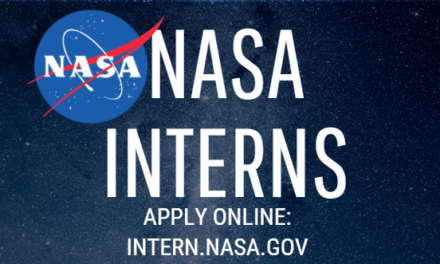
NASA Internships in Urban Development and Climate Change(PAID Internship)
24th February 2024

Amazon Web Services (AWS) Health Equity Initiative: Advancing Global Health Equity Through Technology (Apply for up to $250,000 AWS Credit for Digital Health Cloud Solutions)
28th May 2024
Recent Posts
- APPLY TO ATTEND: Make Your Mark – A McKinsey Pre-MBA Mentorship Programme 10th July 2024
- Exciting Opportunity: Apply for the 2024 PhD in Sustainable Development and Climate Change! 10th July 2024
- NIHR INSIGHT Research Masters Studentships for September 2024: Applications Open 10th July 2024
- Call for Applications – Capacity Strengthening Training on Transitional Justice & Reconciliation and the African Union Transitional Justice Policy (AUTJP) 9th July 2024
- COY19 – Volunteer Application Form 9th July 2024
Recent Videos
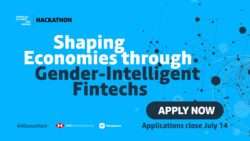
- Empowering Young Leaders for a Healthier Tomorrow: AstraZeneca’s Young Health Programme Impact Fellowship
What is a junior research scientist and how to become one
A junior research scientist is responsible for evaluating and interpreting scientific results from laboratory investigations and experiments. They assist senior scientists in gathering information to support research studies and claims. Junior research scientists perform both laboratory and field trials to collect samples for further examinations. Their duties may include writing research papers, reports, summaries, and reviews, as well as preparing research proposals and helping with grants and funding applications. They must stay updated on relevant scientific and technical studies, developments, and projects. To become a junior research scientist, one typically needs a bachelor's degree, be working towards a master's degree, and have experience in a scientific field.
How long does it takes to become a junior research scientist?
It typically takes 9-11 years to become a junior research scientist:
- Years 1-4: Obtaining a Bachelor's degree in a relevant field, such as biology, chemistry, or physics.
- Years 5-7: Pursuing a doctorate degree in a related field, which can take an additional 3-4 years.
- Years 8-9: Accumulating the necessary work experience, typically 2-4 years, in conducting research, analyzing data, and presenting findings.
- Years 10-11: Completing on-site or on-the-job training, which typically takes 1-2 years, in areas such as laboratory techniques, research methods, and data analysis.
Avg. Salary $67,062
Avg. Salary $59,228
Growth Rate 17 %
Growth Rate 0.3 %
American Indian and Alaska Native 0.15 %
Asian 26.37 %
Black or African American 6.39 %
Hispanic or Latino 9.63 %
Unknown 4.11 %
White 53.36 %
female 51.69 %
male 48.31 %
American Indian and Alaska Native 3.00 %
Asian 7.00 %
Black or African American 14.00 %
Hispanic or Latino 19.00 %
White 57.00 %
female 47.00 %
male 53.00 %
Stress level is manageable
Complexity Level is advanced
7 - challenging
Work Life balance is fair
Newest jobs for Junior Research Scientist in ,
Receive alerts for the newest job postings.
Junior Research Scientist career paths
A junior research scientist can progress to a research scientist, scientist, or senior scientist role. They could also move into a project management or leadership position, like a consultant, project manager, or director. Some may choose to pursue a career in academia, becoming an assistant professor or instructor.
Key steps to become a junior research scientist
Explore junior research scientist education requirements.
The educational requirements for a junior research scientist are typically a doctorate degree. However, some positions may require a master's degree. According to Hansjakob Werlen Ph.D. , Professor, German Studies Coordinator at Swarthmore College, "If your degree is not in a particular high-demand field...consider positions that, while not exactly matching the field of your degree, provide job opportunities where strong language and writing skills are in demand while the specifics of the position can be learned." For those interested in human development, Alessandra Bryant PhD, LMFT, Assistant Professor, Marriage and Family Therapy at Fairfield University, advises that "you really need to pursue a master's degree post bachelor's to ensure job security post-grad." She also suggests having an idea of what specific field to pursue, such as education or mental health.
Most common junior research scientist degrees
Bachelor's
Master's
Start to develop specific junior research scientist skills
A junior research scientist needs a variety of skills. Glenn Starkman , Distinguished University Professor and Co-chair at Case Western Reserve University, states, "Traditional skills are likely to continue to be important: critical thinking and communication, both oral and written. However, I think there is no doubt that there are two new types of skills that will become especially valuable: first, data science and modeling skills, and second, inclusion, diversity, and equity skills." They also need skills in specific areas such as GIS, web development, laboratory techniques, and data analysis.
| Skills | Percentages |
|---|---|
| Python | 21.69% |
| PI | 17.86% |
| C++ | 11.34% |
| Data Collection | 9.80% |
| Data Entry | 5.96% |
Complete relevant junior research scientist training and internships
Research junior research scientist duties and responsibilities.
A junior research scientist's responsibilities often involve developing and implementing research strategies, analyzing data, and presenting findings. As Shiri Noy Ph.D. , Assistant Professor at Denison University, puts it, "Knowing how to collect, systematize, and analyze data, whether that be archival documents, statistical datasets, or interview data, for example, is something that is very appealing to employers." They may also be tasked with supporting other researchers, preparing reports, and mentoring students.
- Manage the development of innovative visualization and concept mapping of contest environment analysis challenges and analyst skill sets.
- Collect DNA and RNA from plants.
- Assist in preparing IRB amendments and submissions.
- Perform ELISA on clinical samples in an NIH fund laboratory.
Prepare your junior research scientist resume
When your background is strong enough, you can start writing your junior research scientist resume.
You can use Zippia's AI resume builder to make the resume writing process easier while also making sure that you include key information that hiring managers expect to see on a junior research scientist resume. You'll find resume tips and examples of skills, responsibilities, and summaries, all provided by Zippi, your career sidekick.
Choose From 10+ Customizable Junior Research Scientist Resume templates
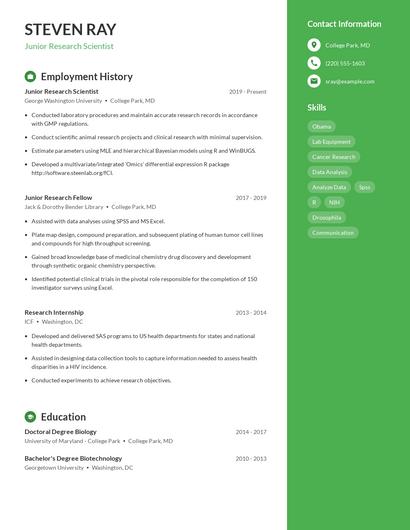
Apply for junior research scientist jobs
Now it's time to start searching for a junior research scientist job. Consider the tips below for a successful job search:
- Browse job boards for relevant postings
- Consult your professional network
- Reach out to companies you're interested in working for directly
- Watch out for job scams
How Did You Land Your First Junior Research Scientist Job

Are you a Junior Research Scientist?
Share your story for a free salary report.
Average junior research scientist salary
The average Junior Research Scientist salary in the United States is $67,062 per year or $32 per hour. Junior research scientist salaries range between $48,000 and $92,000 per year.
What Am I Worth?
How do junior research scientists rate their job?
Junior research scientist reviews.
What I like is that,you get to interact with different people from various communities.Relationships are formed in the process
Language barrier can be a problem,because communication needs to be formed in the language that each community you interact with understands.
Science of observation
Haven't gotten to that point yet! you are looking for a story that has yet left the summary
Updated June 25, 2024
Editorial Staff
The Zippia Research Team has spent countless hours reviewing resumes, job postings, and government data to determine what goes into getting a job in each phase of life. Professional writers and data scientists comprise the Zippia Research Team.
Junior Research Scientist Related Careers
- Assistant Research Scientist
- Associate Scientist
- Chemistry Laboratory Assistant
- Laboratory Research Assistant
- Microbiologist
- Postdoctoral Research Associate
- Professional Research Assistant
- Research And Development Assistant
- Research And Development Scientist
- Research Assistant
- Research Associate
- Research Fellow
- Research Laboratory Technician
- Research Scientist
- Research Technician
Junior Research Scientist Related Jobs
- Assistant Research Scientist Jobs
- Associate Scientist Jobs
- Chemistry Laboratory Assistant Jobs
- Laboratory Research Assistant Jobs
- Microbiologist Jobs
- Postdoctoral Research Associate Jobs
- Professional Research Assistant Jobs
- Research And Development Assistant Jobs
- Research And Development Scientist Jobs
- Research Assistant Jobs
- Research Associate Jobs
- Research Fellow Jobs
- Research Laboratory Technician Jobs
- Research Scientist Jobs
- Research Technician Jobs
Junior Research Scientist Jobs By Company
- Junior Research Scientist Jobs In New York University
- Zippia Careers
- Life, Physical, and Social Science Industry
- Junior Research Scientist
Browse life, physical, and social science jobs

30 Junior Research Analyst Interview Questions and Answers
Common Junior Research Analyst interview questions, how to answer them, and example answers from a certified career coach.

Embarking on a career as a Junior Research Analyst requires a fine balance of quantitative skills, analytical thinking, and an insatiable curiosity. As you prepare for your upcoming interview, it’s essential to demonstrate not only your competency in data analysis but also your passion for uncovering insights that drive strategic decisions.
In this article, we will delve into typical interview questions for a Junior Research Analyst position, including key tips and sample responses designed to help you showcase your expertise and stand out from the competition.
1. Can you describe a research project where you had to gather and analyze data? What were your findings?
This question is a great way for interviewers to assess your analytical skills, problem-solving abilities, and attention to detail. They’re interested in understanding how you approach a research problem, apply methods to gather data, and make sense of that data to draw conclusions. Your ability to carry out these tasks effectively is critical in a role like a Junior Research Analyst, where you’ll often be tasked with using data to inform business decisions.
Example: “In my recent project, I had to research customer satisfaction levels for a new product.
I gathered data through online surveys and direct feedback from customers. After collecting the responses, I used statistical software to analyze the data.
The analysis revealed that while most customers were satisfied with the product’s performance, there was dissatisfaction regarding its price point. This insight helped in re-strategizing the pricing model to increase overall customer satisfaction.”
2. How do you ensure the accuracy and reliability of your research data?
Accuracy and reliability are the cornerstones of any research work. When a hiring manager poses this question, they’re looking to gauge your understanding of the importance of data integrity, your attention to detail, and your ability to employ strategies that ensure your research data is precise, accurate, and reliable. The quality of your research can have a significant impact on decision-making processes within the company, so it’s important to demonstrate that you have robust processes in place to verify your data.
Example: “To ensure the accuracy and reliability of research data, I adhere to a strict protocol.
I start by conducting comprehensive literature reviews to understand the topic thoroughly. This helps me define clear objectives for my research.
Next, I use reliable sources for data collection and apply rigorous sampling techniques to minimize bias. I cross-verify information from multiple sources to enhance its credibility.
Data analysis is performed using appropriate statistical tools. Any anomalies or outliers are investigated to avoid skewing results.
Finally, I document every step of the process meticulously. This not only allows for transparency but also enables replication of the study if needed, further bolstering the reliability of my findings.”
3. What strategies do you use to ensure you stay updated with the latest industry trends and developments?
The essence of a research analyst’s role is to stay on top of industry trends and developments. Interviewers ask this to understand how proactive you are in keeping yourself informed. This reveals your dedication to the job, your resourcefulness, and your ability to adapt to the changing landscape of the industry. Your answer to this question can also provide insight into your analytical skills and how you process and apply the information you gather.
Example: “I regularly read industry-specific publications and subscribe to relevant newsletters. This helps me stay informed about the latest trends, news, and updates in the field. I also attend webinars and online courses that provide insights into current research methods and findings.
Moreover, I leverage social media platforms like LinkedIn for networking with professionals from the same industry. It’s a good source of real-time information as people often share their experiences and knowledge there.
Lastly, participating in industry forums and discussion boards is another strategy I use. These platforms offer valuable insights into new developments and challenges faced by others in the field.”
4. Could you explain a situation where your research findings significantly influenced a business decision?
The essence of a research analyst’s role is to provide data-driven insights that can guide strategic business decisions. By asking this question, hiring managers are seeking to assess your ability to not only conduct thorough, accurate research, but also to interpret your findings in a way that is directly applicable to the business’s goals and initiatives.
Example: “In one instance, I was tasked with researching the potential market for a new product line. My findings revealed that while there was significant interest in the product, our target demographic preferred a different pricing model than what we had initially proposed.
This insight prompted us to rethink our strategy and adjust the pricing model accordingly. By doing so, we were able to successfully launch the product and exceed initial sales projections. This experience highlighted how crucial research is in shaping business decisions and strategies.”
5. How do you handle conflicting data or inconsistencies in a research project?
As a research analyst, you’ll be swimming in a sea of data. It’s inevitable that you’ll encounter conflicting information or inconsistencies. Hiring managers want to gauge your analytical and problem-solving skills in such situations. They’re interested in knowing how you can decipher which data points are most valuable and how you resolve any discrepancies to maintain the integrity of your research.
Example: “In handling conflicting data or inconsistencies, I first verify the sources. If they are credible, I cross-reference the information with other reliable resources to get a broader understanding.
If discrepancies persist, I use statistical methods like sensitivity analysis to assess how changes in one variable impact the results.
I also consider potential biases and errors that may have occurred during data collection or entry. Ultimately, it’s about thorough investigation and applying analytical skills to ensure accurate conclusions.”
6. Can you describe a time when you had to present complex research findings to a non-technical audience? How did you approach this?
This question is designed to assess your ability to translate intricate data into clear, understandable language. As a Junior Research Analyst, you’ll be expected to communicate your findings to a variety of stakeholders, some of which may not have a technical background. It’s essential that you’re able to convey information in a way that’s accessible to everyone, regardless of their familiarity with the subject matter.
Example: “During my master’s degree, I conducted a research project on machine learning algorithms. The challenge was to present my findings to business students with no technical background.
I started by identifying the key points of my research that were most relevant to them. Then, I used simple language and analogies to explain these complex concepts. For instance, I compared the algorithm to a recipe, where certain ingredients (data) lead to specific outcomes.
To ensure understanding, I incorporated visuals like graphs and flowcharts. This approach made the information more digestible and engaging for the audience. After the presentation, many expressed how they found it enlightening despite their initial apprehension about the topic.”
7. How proficient are you with research analysis software and tools? Can you name a few you have experience with?
This question is a test of your technical skills and your ability to keep up with the latest tools in the industry. As a Junior Research Analyst, your role would involve a significant amount of data collection, data interpretation, and report creation. All these tasks require the use of specific research analysis software and tools. The interviewer wants to gauge your experience, proficiency, and adaptability with these tools.
Example: “I am proficient in using various research analysis software and tools. My experience includes using SPSS for statistical analysis, NVivo for qualitative data interpretation, and Tableau for data visualization. I have also worked with Python and R for more complex data manipulation and analysis tasks. These tools have been instrumental in my ability to effectively analyze and interpret data, providing valuable insights.”
8. Explain a situation where you had to work under tight deadlines on a research project. How did you manage your time?
Time management and the ability to work under pressure are critical skills for a Research Analyst. It’s not uncommon to have multiple projects running concurrently or urgent requests coming in. Potential employers want assurance that you have the capacity to prioritize tasks, organize your work effectively, and still deliver high-quality results even in a high-pressure environment.
Example: “During my final year of university, I was tasked with a complex research project that required extensive data analysis within a tight two-week deadline. To manage this effectively, I prioritized tasks according to their complexity and urgency.
I began by mapping out the entire project timeline, breaking it down into smaller, manageable tasks. This allowed me to visualize the process and allocate time appropriately for each task.
To ensure efficiency, I used productivity tools like Trello for tracking progress and Google Calendar for scheduling dedicated work hours. I also made sure to keep communication lines open with my professor for any necessary clarifications.
Despite the pressure, I completed the project on time without compromising its quality. This experience taught me the importance of effective time management in research projects.”
9. What kind of research methodologies are you most comfortable with, and why?
Understanding which research methodologies you’re comfortable with is essential for hiring managers because they want to assess your technical skills and your ability to gather, analyze, and interpret data. This question also allows them to gauge your critical thinking, your problem-solving skills, and your understanding of the research process, which are all key to success in a research analyst role.
Example: “I am most comfortable with both qualitative and quantitative research methodologies. Quantitative methods allow for statistical analysis of data, providing concrete numerical results that can guide decision-making processes. On the other hand, qualitative methods offer in-depth insights into attitudes, perceptions, and behaviors which are crucial to understanding complex issues. My comfort with these methodologies stems from my academic background where I extensively used them during my coursework and thesis project. I believe a combination of both approaches provides a comprehensive view of any research problem, enhancing the quality of findings and recommendations.”
10. How do you approach the initial stages of a new research project?
Hiring managers pose this question to gauge your strategic thinking and planning abilities. A significant aspect of a research analyst’s role is to initiate and plan research projects. Understanding how you approach a new project provides insight into your problem-solving skills, your ability to think critically, and your knack for identifying key elements or issues that need to be addressed. It also helps them evaluate your resourcefulness and efficiency in gathering necessary data or information.
Example: “In the initial stages of a new research project, I start by understanding and defining the problem. This involves studying the project brief in detail and identifying key objectives.
Next, I conduct preliminary research to gather background information on the topic. It helps me understand the context and identify gaps in existing knowledge.
I then formulate a hypothesis or research question, which guides the rest of my work.
Following this, I design a research plan outlining methodologies, tools, and timelines.
Throughout this process, I ensure to maintain open communication with stakeholders for feedback and adjustments.”
11. Can you give an example of a time when you had to use critical thinking skills in your research work?
Critical thinking is a vital skill for a research analyst. You need to be able to identify problems, question assumptions, and analyze data to inform business decisions. So, your interviewer wants to hear about a time when you’ve used critical thinking to solve a complex problem or make a significant contribution to your research work. This will help them determine whether you have the necessary analytical skills to be successful in the role.
Example: “During my postgraduate studies, I was involved in a project that required analyzing large datasets. The data appeared to show a clear trend, but on closer inspection, there were inconsistencies. Instead of accepting the initial findings, I used critical thinking skills to question and probe deeper.
I cross-verified the data from different sources, reanalyzed it using various statistical methods, and consulted with experts in the field for their interpretation. This led to a more nuanced understanding of the data, which significantly impacted our research conclusions. It taught me the importance of not taking things at face value in research work and always questioning and validating the results.”
12. How do you handle a situation where your research findings are not aligning with the project’s expected outcome?
This question is aimed at evaluating your problem-solving skills and integrity as a researcher. It can be tempting to manipulate data or ignore certain findings to fit a preconceived narrative. However, good research is about discovering the truth, even if it’s not what you expected or wanted to find. So, employers want to see that you have the courage to present your findings accurately and the ability to handle the potential backlash professionally.
Example: “When research findings don’t align with project expectations, I believe it’s crucial to communicate this discrepancy transparently and promptly. The next step would be a thorough reevaluation of the data collected and methodologies used for possible errors or oversights.
If the results still hold, it may indicate that our initial assumptions were incorrect. In such cases, we should consider these findings as new insights rather than setbacks. They could lead us to adjust our strategies or even redefine the project goals based on empirical evidence, thus ensuring more accurate and realistic outcomes.
In essence, my approach is rooted in clear communication, meticulous reassessment, and flexibility to adapt based on new information.”
13. What steps do you take to ensure your research is ethically conducted?
Ethics is at the core of any research work. It is about respecting the rights and dignity of research participants, ensuring confidentiality and privacy, and promoting the integrity of research. Interviewers want to see that you have a deep understanding and commitment to ethical principles in conducting research. This demonstrates your professionalism and responsibility, which are vital qualities in a research analyst.
Example: “To ensure ethical conduct in research, I start by thoroughly understanding the guidelines and standards set by relevant regulatory bodies. This includes respecting participant confidentiality and informed consent.
I also prioritize transparency in my methodology to provide clear insight into how conclusions are reached.
Furthermore, I am committed to avoiding any conflicts of interest and maintaining integrity in data collection and analysis.
Lastly, I believe in continuous learning and staying updated with evolving ethical norms in research.”
14. How do you prioritize your tasks when working on multiple research projects?
The ability to prioritize tasks is a key skill for a research analyst. It’s not uncommon for analysts to be working on multiple projects concurrently, each with its own deadlines and deliverables. Hiring managers are keen on understanding your strategy for organizing your workload, meeting deadlines, and ensuring the quality of your work isn’t compromised, even when juggling multiple responsibilities.
Example: “Prioritizing tasks in multiple research projects involves a strategic approach. I start by understanding the scope, deadlines and objectives of each project. This helps me to identify critical tasks that need immediate attention.
I then use tools like Trello or Asana to visually organize these tasks based on their priority level. High-priority tasks are those directly impacting the project’s timeline or results.
Simultaneously, I maintain open communication with team members and stakeholders to stay updated about any changes in priorities.
This method ensures efficient time management while maintaining quality across all projects.”
15. Describe a time when your research findings were challenged. How did you defend your results?
This question is designed to assess your critical thinking skills and how you handle scrutiny. In the realm of research, having your findings challenged is commonplace. It’s a way to ensure accuracy, validity, and integrity of the work. As a Junior Research Analyst, you’ll need to demonstrate not only your ability to conduct sound research, but also your ability to defend your findings convincingly and professionally.
Example: “During my final year at university, I conducted a study on consumer behavior in online shopping. My findings suggested that convenience was the primary motivator for consumers, which contradicted some established theories.
When challenged by my professor, I defended my results by explaining the methodology and statistical analysis used to arrive at my conclusions. I also highlighted how recent trends like increased smartphone usage could have influenced the shift in consumer behavior.
This experience taught me the importance of thorough data analysis and being prepared to justify your research outcomes.”
16. Can you explain a complex research concept in simple terms?
The essence of a research analyst’s role is to distill complex information into digestible, actionable insights. So, if you’re faced with this question, your potential employer wants to gauge your ability to simplify and communicate complex ideas in a clear and concise manner. This skill is crucial when presenting findings to colleagues or stakeholders who may not have a deep understanding of the research subject.
Example: “Sure, let’s take the concept of machine learning. It’s like teaching a child to identify objects. Initially, you show them various images of an object, say a dog, and tell them it’s a dog. After repeated exposure, even if you show them a new picture of a different dog, they can recognize it as a dog. That’s essentially what machine learning is – feeding a computer system lots of data so that it learns and can make accurate predictions or decisions when new data is introduced.”
17. What kind of data visualization techniques do you prefer to use in presenting your research findings?
The essence of a research analyst’s role is to convert complex data into understandable and actionable insights. A key part of that process is effective data visualization. By asking this question, the hiring manager wants to assess your ability to present data in a clear, concise, and visually appealing manner that can easily be digested by various stakeholders, regardless of their familiarity with data analysis.
Example: “I prefer using a combination of charts and graphs to visualize data. Bar or column charts are excellent for comparing items, while line graphs work well for showing trends over time. For complex datasets with multiple variables, scatter plots can be useful. I also appreciate the power of heat maps in representing density of data points.
However, my choice of visualization technique always depends on the nature of the data and the story that needs to be told. It’s crucial to select a method that effectively communicates the key findings to the audience.”
18. How do you keep your research data organized and easily accessible?
Being able to efficiently manage data is a critical part of a Research Analyst’s role. The hiring manager wants to ensure that you have effective systems and processes in place to keep your research data organized and easily accessible. This not only promotes productivity but also reduces the risk of errors or misinterpretations that could lead to incorrect insights or conclusions.
Example: “I utilize a combination of digital tools and traditional methods to keep my research data organized. I use cloud-based platforms like Google Drive for storing and categorizing data files, which also allows easy access from any device.
For data analysis, I use software such as Excel or SPSS to maintain databases. This helps in sorting, filtering, and analyzing the data efficiently.
To ensure data integrity, I follow a strict naming convention for all files and folders. Regular backups are scheduled to prevent any loss of data.
Moreover, I believe in documenting everything – each step taken, changes made, and observations noted during the research process. This not only keeps things transparent but also makes it easier to revisit any stage if required.”
19. Can you describe a time when you had to modify your research strategy midway through a project?
Adaptability and flexibility are key in a research role. Not every project will go according to plan, and it’s important to show that you can adjust your approach and strategy based on new data, obstacles, or changes in project goals. This question allows the interviewer to gauge your problem-solving skills and your ability to work under changing circumstances without losing sight of the project’s objectives.
Example: “During a project on market trends analysis, I initially planned to collect data through online surveys. However, the response rate was lower than expected and the data collected wasn’t sufficient.
I quickly adapted by incorporating face-to-face interviews in public places like shopping malls where I could interact with a larger audience. This change not only provided more data but also offered deeper insights into consumer behavior which significantly enriched our research findings.
This experience taught me the importance of flexibility and adaptability in research work.”
20. What are the key factors you consider when interpreting data from your research?
As a research analyst, your ability to interpret data correctly and make accurate predictions is vital. The interviewer wants to understand your analytical thought process and see if you’re able to consider multiple factors, such as the data source, methodology, potential bias, and the context in which the data was collected. Your answer will help them assess if you can provide valuable insights that can aid in decision making.
Example: “When interpreting data, I consider the following key factors:
1. Context: Understanding the background of the research is crucial to make meaningful interpretations.
2. Relevance: The data should be relevant to the research question or hypothesis under investigation.
3. Accuracy: It’s important to verify the accuracy and reliability of the collected data.
4. Variability: Recognizing patterns, trends, and outliers in the dataset helps draw valid conclusions.
5. Statistical Significance: This determines if the findings are due to chance or represent a true effect.
6. Replicability: If the results can be replicated in other studies, it increases their validity.
These factors help ensure that the interpretation of data is accurate, reliable, and meaningful.”
21. How do you handle feedback and criticism about your research work?
As a Junior Research Analyst, your work is largely based on constant learning and improvement, and criticism or feedback often serves as the catalyst for that growth. Hiring managers ask this question to gauge your ability to handle critique without taking it personally, as well as to understand how you utilize feedback to refine your research skills and produce better work in the future.
Example: “I view feedback and criticism as an opportunity for growth. When I receive it, I take time to understand the perspective of the person giving it. If something is unclear, I ask questions to ensure I fully grasp their point.
Once I have a clear understanding, I reflect on how this feedback can improve my research work. This could involve revising methodologies, reevaluating data or reconsidering conclusions drawn.
It’s important to remember that everyone has room for improvement. Being open to critique allows me to continually refine my skills and produce better quality research.”

22. What steps do you take to ensure the confidentiality and security of your research data?
Research data, particularly in fields like finance or healthcare, can be sensitive and confidential. It’s essential to ensure that the data you work with is protected from unauthorized access or accidental loss. Employers want to know that you understand the importance of data security and have practical strategies for maintaining the confidentiality of your research data.
Example: “To ensure the confidentiality and security of research data, I follow a few key steps:
I use strong, unique passwords for all systems and change them regularly.
Data is stored on secure, encrypted servers with restricted access to only those necessary.
I utilize two-factor authentication where possible for added security.
Regular backups are made to prevent loss or corruption of data.
All sensitive information is anonymized or pseudonymized to protect identities.
Finally, I stay updated on latest cybersecurity practices and threats to remain proactive in data protection.”
23. Can you illustrate a time when you used innovative methods to conduct your research?
An innovative approach to research signifies a candidate’s ability to think outside the box, problem-solve creatively, and potentially bring fresh perspectives to the team. Moreover, it shows that the candidate can adapt to different situations and is not afraid to explore new methods or techniques to obtain the most accurate results. This question helps employers gauge your flexibility, creativity, and problem-solving skills—all of which are highly valuable in a research setting.
Example: “During my final year project at university, I was tasked with analyzing a large dataset on consumer behavior. Traditional methods were time-consuming and inefficient. So, I decided to use Python programming for data cleaning and analysis. This approach not only expedited the process but also helped identify hidden patterns in the data. The insights derived from this innovative method significantly enhanced the quality of our research findings.”
24. How do you handle situations where you have to conduct research in an area you are not familiar with?
This question is a nod to the fact that research analysts often have to delve into unfamiliar territory. Your adaptability, resourcefulness, and commitment to accuracy are being tested here. The interviewer wants to know how you approach new challenges, how you ensure you’re gathering the most accurate data, and how you can translate complex, unfamiliar information into digestible insights.
Example: “When faced with researching an unfamiliar topic, I start by conducting a broad search to gain a general understanding. Then, I narrow down my focus based on key findings or areas of interest.
I utilize reputable sources and databases for accurate information, ensuring that I cross-verify facts from multiple sources.
If needed, I reach out to subject matter experts or industry professionals for further insights. This approach ensures comprehensive research results, even in unfamiliar territories.”
25. Can you describe a time when you had to collaborate with others on a research project?
Teamwork is a key component in most roles, but it’s especially critical in a research setting where diverse perspectives and skill sets can greatly enhance the quality of a project. By asking this question, hiring managers are looking to assess your ability to work cohesively with others, manage conflict, and contribute effectively to a team dynamic.
Example: “During my final year at university, I was part of a team that conducted research on consumer behavior trends in the retail industry. My role involved data collection and analysis.
I collaborated closely with other team members to ensure consistency in our methods and findings. We had regular meetings for progress updates and brainstorming sessions. This experience taught me the importance of clear communication and active listening in a collaborative environment.
Our collective efforts resulted in an insightful report which received commendation from our professor. This project reinforced my belief in the power of teamwork in achieving complex objectives.”
26. How do you ensure the quality and validity of your research sources?
This question is designed to assess your critical thinking skills and your ability to discern reliable information from unreliable sources. As a junior research analyst, the quality of your work is largely determined by the quality of your sources. Therefore, it is essential you demonstrate your ability to evaluate the credibility of your sources and ensure the information you’re using is accurate and reliable.
Example: “Validating research sources involves a two-step process. I start by evaluating the credibility of the source, considering factors like the author’s credentials, the publication date, and whether it has been peer-reviewed.
Next, I cross-verify information from multiple credible sources to ensure accuracy. If there are discrepancies, I delve deeper until I find consensus or can justify why one source may be more accurate. This rigorous approach ensures that my research is both reliable and valid.”
27. What are some challenges you have faced in past research projects and how did you overcome them?
This question is designed to gauge your problem-solving skills and how you approach challenges. As a research analyst, your job will involve tackling complex problems and finding viable solutions. By asking about your past experiences, potential employers get a glimpse into your thought process, your persistence, and your ability to adapt in the face of adversity. They want to ensure you won’t be deterred by hurdles but will find innovative ways to overcome them.
Example: “One significant challenge I encountered was during a market research project when we had to analyze large datasets. The data was unstructured and required extensive cleaning, which was time-consuming.
To overcome this, I utilized my programming skills in Python and R to automate the process. This not only improved efficiency but also reduced the chances of human error.
Another issue was dealing with incomplete information or missing data points. To address this, I used statistical methods like regression analysis and multiple imputation to fill gaps intelligently.
These experiences taught me the importance of adaptability and problem-solving in research projects.”
28. How do you approach problem-solving when you encounter obstacles in your research?
This question is designed to assess your analytical skills and ability to think strategically. In a research role, you’re likely to encounter numerous obstacles that can derail your work or lead to inaccurate conclusions. A potential employer wants to know that you can identify these pitfalls, apply critical thinking, and devise effective solutions to keep your research on track.
Example: “When I encounter obstacles in research, my first step is to understand the nature of the problem. This involves identifying what information is missing or unclear and why this obstacle has arisen.
I then brainstorm potential solutions, utilizing resources such as academic journals, industry reports, or consulting with colleagues for their insights.
If these approaches don’t resolve the issue, I consider alternative methods that might help me bypass the obstacle, such as using different data sources or adjusting the scope of the research.
Throughout this process, it’s crucial to maintain a flexible mindset and be open to changing the course if necessary. This adaptability allows me to effectively navigate through challenges and ensure the quality of my research output.”
29. Can you share an example of a research report you’re particularly proud of and why?
The crux of a research analyst’s role is conducting in-depth research and compiling detailed reports. Interviewers want to understand your process, how you handle data, and your presentation skills. They’re also interested in your ability to critically evaluate your work, and what you consider to be high-quality research. Sharing an example of a research report you’re proud of offers a tangible demonstration of your skills and your ability to deliver.
Example: “One of my proudest research reports was on the impact of Brexit on European pharmaceutical companies. I used a mix of qualitative and quantitative analysis, drawing data from various sources like financial statements, market trends, and regulatory changes.
The report provided valuable insights into potential risks and opportunities for these companies post-Brexit. It was well-received by my team and even utilized in making strategic decisions. This project showcased my ability to conduct comprehensive research and deliver actionable insights, which are critical skills for a Junior Research Analyst.”
30. How do you keep yourself motivated during long and complex research projects?
This question probes your ability to stay focused and maintain your enthusiasm over the long haul. Research projects can often last months or even years, and they typically involve many tedious and repetitive tasks. The interviewer wants to understand your strategies for staying committed and productive during these demanding periods, and how you ensure that the quality of your work doesn’t suffer.
Example: “To stay motivated during long and complex research projects, I set clear, achievable goals at each stage. This helps me to track progress and provides a sense of accomplishment regularly.
I also maintain my enthusiasm by constantly reminding myself of the project’s significance and potential impact. It fuels my drive to see it through to completion.
Moreover, taking short breaks to recharge is crucial. It prevents burnout and keeps my perspective fresh.
Lastly, I find collaborating with others stimulating. Sharing ideas and challenges often sparks creativity and boosts motivation.”
30 Learning Manager Interview Questions and Answers
30 gas plant operator interview questions and answers, you may also be interested in..., 30 software development engineer interview questions and answers, 20 assistant housekeeping manager interview questions and answers, 30 architectural drafter interview questions and answers, 30 patient representative interview questions and answers.
Accessibility links
- Skip to content
- Accessibility Help
- Ready for Change
- Ready for Work
- Explore Industries
- Super Assembly
Junior Researcher
Rebecca highlights the skills required to be a junior researcher in bbc learning., jobs in digital and learning.

Assistant Producer
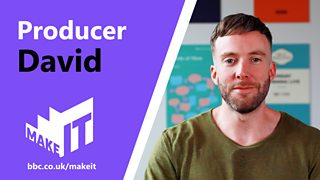
Stack Exchange Network
Stack Exchange network consists of 183 Q&A communities including Stack Overflow , the largest, most trusted online community for developers to learn, share their knowledge, and build their careers.
Q&A for work
Connect and share knowledge within a single location that is structured and easy to search.
What is a junior researcher in academia
Can we call someone a junior researcher if he or she has obtained their Ph.D recently and also has research stay abroad?
- academic-life
- assistant-professor
I would classify a "junior" researcher as pretty much anyone who does not yet have a permanent position. (The question of whether a tenure-track faculty member is a "junior" researcher might be open, but anything "below" that is not, at least in my mind.)
So yes, someone who has had a research stay abroad and has recently received a PhD is still very much a "junior" researcher.
You must log in to answer this question.
Not the answer you're looking for browse other questions tagged academic-life assistant-professor ..
- Featured on Meta
- We spent a sprint addressing your requests — here’s how it went
- Upcoming initiatives on Stack Overflow and across the Stack Exchange network...
Hot Network Questions
- Unable to use split. tryed doing with align got more error in that also due to this im unable to fit the equation the page
- How does light beyond the visible spectrum relate to color theory?
- Why does Macbeth well deserve his name?
- Pattern on a PCB
- ArXiv submission on hold for 11 days. Should I inquire via moderation support or wait longer?
- Looking for title of old Star Trek TOS book where Spock is captured and gets earring
- How to choose between 3/4 and 6/8 time?
- Upgrading SQL Server Express 2008 R2 that seems to be tied with SQL Server Standard
- Simple probability question - seeming contradiction
- Could a Black Market exist in a cashless society (digital currency)?
- Coping with consequences of a dog bite before buying a puppy
- Help understanding the implications of Security Breach section of an NDA
- Algebraic and continuous duals of an inverse limit of finite dimensional vector spaces
- Confusion regarding "since" vs "for"
- Should I apologise to a professor after a gift authorship attempt, which they refused?
- A model suffering from omitted variable bias can be said to be unidentified?
- Does the proverb "having your cake and eating it too" imply hypocrisy?
- Is it possible to replace the flat-top pins on flat pedals with ones that have a dome top?
- Reference about cancellation property for semigroups
- A Ring of Cubes
- Eliminate some numbers so that each of the three rows contains the numbers 1 through 9 each exactly once
- Are there other proposed translations of "aelfheres" in Beowulf than a name?
- Part name of this IC - Analog Devices, 8-pin, "S 6B" A 06" "C 42"
- Does 誰と mean 誰とも?
FreshersGroup.com
NIMHANS Recruitment 2024 – Apply Offline for 1 Junior Research Fellow @ nimhans.ac.in
Published on July 8, 2024
NIMHANS Recruitment 2024 Apply for 1 Junior Research Fellow Vacancies in Bangalore – Karnataka location. National Institute of Mental Health and Neuro-Sciences Officials are recently published a job notification to fill up 1 Posts through Offline mode. All the eligible aspirants can check the NIMHANS career official website i.e., nimhans.ac.in recruitment 2024. The last date to Apply Offline on or before 11-Jul-2024.
NIMHANS Recruitment 2024
Organization Name : National Institute of Mental Health and Neuro-Sciences ( NIMHANS ) Post Details : Junior Research Fellow Total No. of Posts : 1 Salary: Rs.42,000/- Per Month Job Location: Bangalore – Karnataka Apply Mode : Offline Official Website : nimhans.ac.in
NIMHANS Recruitment required eligibility details
Educational Qualification: As per NIMHANS official notification candidate should have completed Masters Degree, M.Phil from any of the recognized boards or Universities.
Age Limit: As per the National Institute of Mental Health and Neuro-Sciences recruitment notification, the candidate’s maximum age should be 35 years .
Application Fee:
No Application Fee.
Selection Process:
Steps to apply for nimhans junior research fellow jobs 2024.
- First, visit the official website @ nimhans.ac.in
- And check for the NIMHANS Recruitment or Careers to which you are going to apply.
- Download the application form for Junior Research Fellow Jobs from the official website or Notification Link.
- Check the last date before starting the application form.
- Fill the application form without any mistakes.
- Pay the application fee (If applicable) and submit the application form to the below address along with required documents with self-attested, before the last date (11-Jul-2024)
- Capture the Application form number/courier acknowledgment number for future reference.
How to apply for NIMHANS Recruitment (Junior Research Fellow) Jobs
Interested and eligible candidates can apply through the prescribed application form. The Applicant needs to send the application form along with relevant documents to Committee Room, adjacent to the Academic & Evaluation Section, IV Floor, Neurobiology Research Centre, Administrative Block, NIMHANS, [email protected]
Important Dates:
- Start Date to Apply Offline: 05-07-2024
- Last Date to Apply Offline: 11-Jul-2024
NIMHANS Notification Important Links
- Official Notification pdf: Click Here
- Official Website: nimhans.ac.in
Education Wise Jobs
- 10th Pass Jobs
- 12th Pass Jobs
- Degree Govt Jobs
- Diploma Govt Jobs
- B.Tech Jobs
- M.Tech Jobs
- Graduation Jobs
- Post Graduation
Top City Jobs in India
- Bhubaneswar
- Gandhinagar
- Thiruvananthapuram

Dr. Jones Receives NIH Funding for National Career Development Program, Dr. Gelineau-Morel Selected as Supported Investigator
July 10, 2024.
Bridgette L. Jones, MD, MSCR
Professor of pediatrics, university of missouri-kansas city school of medicine; education associate professor of pediatrics, university of kansas school of medicine.
Rose N. Gelineau-Morel, MD
Clinical assistant professor of pediatrics, university of missouri-kansas city school of medicine; clinical assistant professor of pediatrics, university of kansas school of medicine.
Bridgette Jones, MD, MSCR , Clinical Pharmacology and Toxicology, Children’s Mercy Kansas City, is a multiple principal investigator (MPI) along with MPIs Daniel Gonzalez, PhD, PharmD, Duke University, Daniel K. Benjamin, MD, MPH, PhD, Duke University, and Adriana H. Tremoulet, MD, MAS, University of California San Diego, on a Pediatric Clinical Pharmacology Research Career Development Award (K12 Clinical Trial Not Allowed) from National Institutes of Health (NIH), Eunice Kennedy Shriver National Institute of Child Health and Human Development (NICHD) – project number 1K12HD113189-01.
The NIH K12 award funds a national program to support the development of pediatric clinical pharmacology researchers and strengthen the community of clinical pharmacologist investigators engaged in pediatric clinical pharmacology research.
This funding opportunity supports institutional research career development (K12) programs that support mentored research and career development experiences for scholars pursuing clinical, translational, and/or basic research in pediatric therapeutics. The program establishes a national network of mentors and scholars, in contrast to K12 programs that are based solely at a single applicant institution. A big part of this program is to ensure that there exists a pipeline of diverse and highly trained workforce available in pediatric pharmacology-related clinical and biomedical fields that currently have a limited number of researchers. This funding supports essential research career development opportunities and works to ensure “protected” time to pursue impactful research experiences for new faculty-level clinical pharmacologists, fostering the transition to productive highly skilled clinical pharmacologist investigators. Scholars are funded in the program for 1-2 years.
Rose Gelineau-Morel, MD , Neurology and Clinical Pharmacology and Toxicology, is one of two who was funded through the first cohort of junior scholars within this program. She receives $108,000 for her first year, which ends in July 2024. She is expected to receive $135,000 for her second year, which would run through July 31, 2025, bringing her total over the two years to $243,000.
Specifically, the funding will be used to support Dr. Gelineau-Morel as she becomes an independent investigator in model-informed precision dosing to facilitate clinical trials for children with cerebral palsy (CP), and especially dystonia (DCP). DCP is a movement disorder with a similar incidence to Parkinson’s Disease and is the greatest determinant of functional impairment in children with CP. Yet, there are no FDA-approved treatments, and even off-label treatments are minimally effective.
Previous research has shown that Trihexyphenidyl (THP), a racemic mixture of R and S enantiomers, was effective but some participants had treatment-limiting side effects.
“These side effects support the need for precision dosing to optimize drug exposures,” said Dr. Gelineau-Morel.
This funding will expand Dr. Gelineau-Morel's skillset with additional training to systematically investigate pharmacogenetic sources of variability in drug exposure and develop model-informed precision dosing recommendations for exposure-controlled clinical trials.
In her role in this, Dr. Jones serves as the point of contact for scholars at Children’s Mercy interested in applying and a contact and mentor for those admitted into the K12 program.
The contents are those of the investigator and do not necessarily represent the official views of, nor an endorsement, by NIH, or the U.S. Government
Cookie information
Welcome to the EY careers job search site. This website is based on the SuccessFactors software provided by SAP. On this page, functional and optional cookies are used to improve your experience and design our careers site more user-friendly and in line with your needs. In this context, cookies from providers in third countries may also be used and data may be transmitted to providers such as social media services outside the EU. For this we require your consent. By clicking "Accept All Cookies", you agree to these. This also includes your consent to the transmission of certain personal data to third countries, including the USA, in accordance with Art. 49 (1) (a) GDPR. You can select your settings by clicking “Modify Cookie Preferences” to confirm your choices from the optional cookie tracking and selecting the required cookies required to remain on the site. You can change your selection at any time by clicking the link at the bottom of the page.

- Deutsch (Deutschland)
- English (United Kingdom)
- English (United States)
- Español (México)
- Français (Canada)
- Français (France)
- עִבְרִית (יִשְׂרָאֵל)
- Português (Brasil)
- Careers at EY
- What you can do here
- What it's like to work here
- How to join us
- Experienced jobs
- Student jobs
Junior Data Analyst (H/F)
Job description.
EY is currently looking for a Data Analyst with Python knowledge and with a good French level - Junior to join our Tax Technology practice.
Key Responsibilities
- Assist with importing, cleansing, and correcting accounting data to prepare it for analysis using Python/Pandas/Excel
- Ability in interpreting accounting data and analyzing results using different techniques
- Experience in data models and data sets, variety of data sources and data cleaning methods
- Perform reconciliations of tax and accounting data to financial statements and other accounting records
- Create reports and presentations to help communicate data findings to team members
- Participate in team meeting and drafting meeting notes
- Develop a strong understanding of business requirements; working with business users/ business analysts to define probable solutions.
Qualification & Experience Required
Bachelors / master’s degree in accounting / information Technology / business analytics or related field.
Basic knowledge of accounting principles and practices is a must.
No less than 1 year of hands-on experience with data manipulation (Analysis) using Python/Pandas
Must have knowledge in relational databases, Hands on experience in SQL Queries
Strong verbal and written communications skills in French and English.
Mastery of Pack Office
In the context of its Diversity policy, EY considers, on an equal skills basis, all applications, including those from individuals with disabilities. EY offers a multitude of experiences to live, numerous sectors to explore, and extraordinary encounters.
Join us in building a better working world.
Live the EY experience, join us!
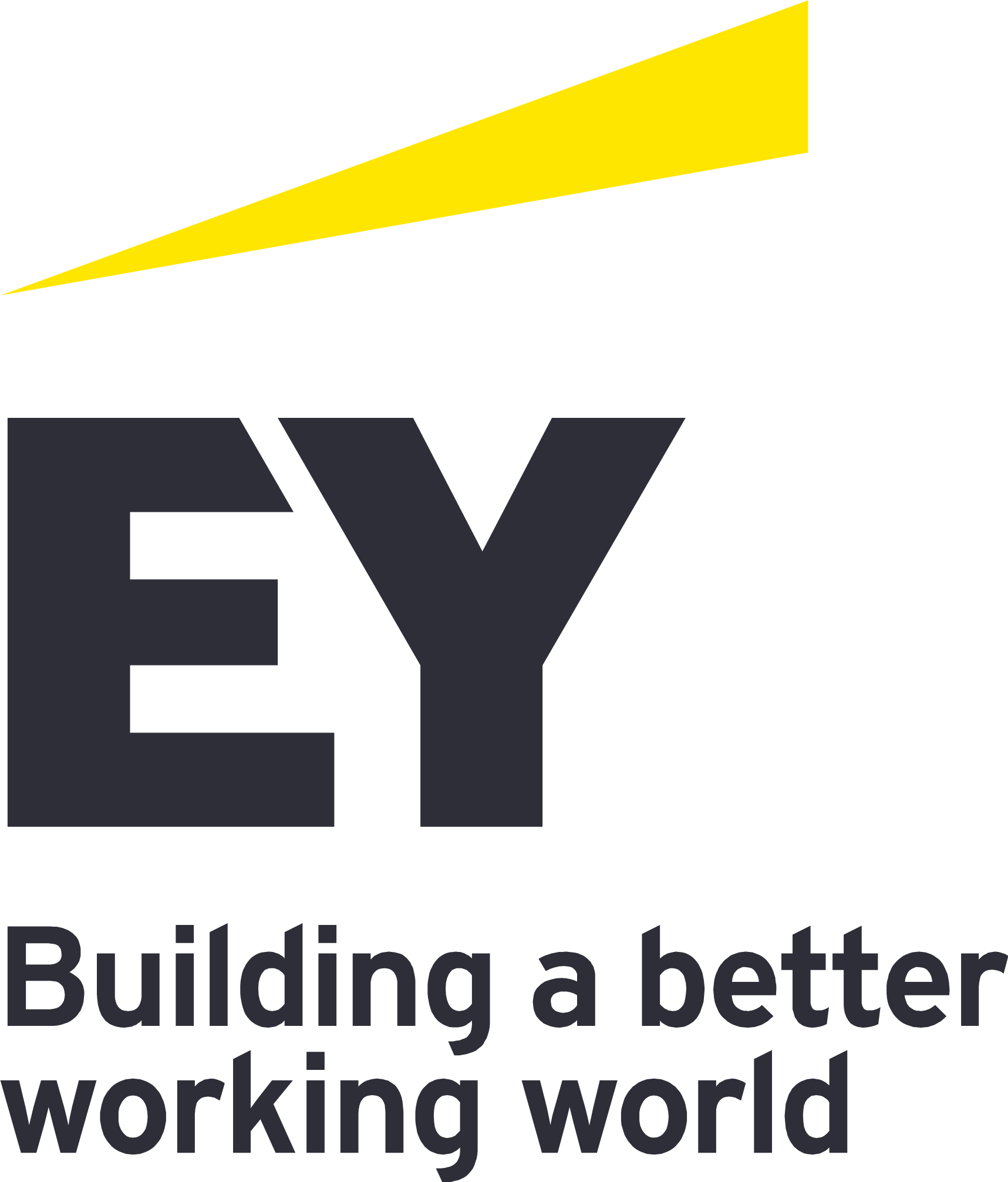
- Connect with us
- Our locations
- Legal and privacy
- Labor condition applications
Cookie Consent Manager
EY refers to the global organization, and may refer to one or more, of the member firms of Ernst & Young Global Limited, each of which is a separate legal entity. Ernst & Young Global Limited, a UK company limited by guarantee, does not provide services to clients.
When you visit any website, it may store or retrieve information on your browser, mostly in the form of cookies. Because we respect your right to privacy, you can choose not to allow some types of cookies. However, blocking some types of cookies may impact your experience of the site and the services we are able to offer.
Required Cookies
These cookies are required to use this website and can't be turned off.
| Provider | Description | Enabled |
|---|---|---|
| SAP as service provider |
Advertising Cookies
These cookies serve ads that are relevant to your interests. You may freely choose to accept or decline these cookies at any time. Note that certain functionality that these third parties make available may be impacted if you do not accept these cookies.
| Provider | Description | Enabled |
|---|---|---|
| AddThis | | |
| | ||
| Google Analytics | | |
| Google Tag Manager | |
COLUMBIA UNIVERSITY IN THE CITY OF NEW YORK

Junior Programmer - General Medicine
- Columbia University Medical Center
- Opening on: Jul 8 2024
- Technical Grade 5
- Job Type: Support Staff - Union
- Bargaining Unit: SSA
- Regular/Temporary: Regular
- Hours Per Week: 35
- Salary Range: $59,845.49 - $59,845.49 annual
Position Summary
Reporting the Director and working with the research team, the Junior Programmer will provide support to the Healthcare Innovations Research and Evaluation (HIRE) program.
Responsibilities
- Support the day-to-day functions of the HIRE group
- Perform data analysis using R, python, and other coding languages
- Help maintain databases to ensure integrity and usability
- Assist with manuscripts for publication, as well as grant writing
- Perform additional related duties as needed
Minimum Qualifications
- Two years of training in computer sciences at college or technical school or equivalent and at least six months experience
- Strong quantitative skills
- Critical thinking and creative problem solver with ability to work independently as well as part of a team
- Well-organized, self-starter needed with strong attention to details and time management skills
- Excellent interpersonal and communication skills
- The ideal candidate will be proactive, extremely organized and able to multitask in a diverse research environment
Preferred Qualifications
- Proficiency in one or more programming languages with preference given to R, Python and/or C++
- Experience in modeling or statistics or computer coding
- Experience in programming, scientific analyses, and publication
Other Requirements
- The candidate selected for this position is required to undergo a drug screening test prior to a final offer of employment being made
- Successful completion of applicable compliance and systems training requirements
Equal Opportunity Employer / Disability / Veteran
Columbia University is committed to the hiring of qualified local residents.
Commitment to Diversity
Columbia university is dedicated to increasing diversity in its workforce, its student body, and its educational programs. achieving continued academic excellence and creating a vibrant university community require nothing less. in fulfilling its mission to advance diversity at the university, columbia seeks to hire, retain, and promote exceptionally talented individuals from diverse backgrounds. , share this job.
Thank you - we'll send an email shortly.
Other Recently Posted Jobs
Assistant Director, Media Relations
Financial aid officer, vendor management analyst (hybrid schedule).
Refer someone to this job

- ©2022 Columbia University
- Accessibility
- Administrator Log in
Wait! Before you go, are you interested in a career at Columbia University? Sign up here!
Thank you, for sharing your information. A member of our team will reach out to you soon!

This website uses cookies as well as similar tools and technologies to understand visitors' experiences. By continuing to use this website, you consent to Columbia University's usage of cookies and similar technologies, in accordance with the Columbia University Website Cookie Notice .
AIIMS Delhi Jobs Notification 2024: Apply Offline for 1 Junior Research Fellow Vacancies

AIIMS Delhi Jobs Notification 2024 information for the hiring of 1 Junior Research Fellow Posts has been released on the official website at aiims.edu. Candidates Planning to start their career with All India Institute of Medical Sciences Delhi can apply Offline application on or before 2024-07-16.
| Organization Name | All India Institute of Medical Sciences Delhi |
| Post Name | Junior Research Fellow |
| No. of Vacancies | 1 |
| Educational Qualification | Degree, Graduation, Post Graduation |
| Official Website | aiims.edu |
| Mode | Offline |
AIIMS Delhi Post Details
Junior Research Fellow : 1 Post
- Qualification : Post Graduate degree in Basic Science or Graduate/ Post Graduate Degree in professional course
- Salary Details : As Per Norms
- Age Limit : 30 years
- Selection Process : Selection will be based on the Interview
How to Apply : Interested and eligible candidates send your CV with the supporting documents. Address: [email protected] on or before 16th July 2024.
Important Dates
Start Date : 08-07-2024 Last Date: 2024-07-16
Important Links
Notification Link
Leave a Comment Cancel reply
Search & Apply for Jobs
Search by Keyword
Search by Location
Please select a location from the dropdown to proceed.
You are now leaving Citi Careers portal, and entering a third-party site, operated on behalf of Citi.
Our Resume Match feature is available for roles in:
- Philippines
- Puerto Rico
- United Kingdom
- United States
For all other locations, please use our keyword search.
Junior Account Reference Data Analyst
Are you looking for a career move that will put you at the heart of a global financial institution? Then bring your skills in analysis, problem solving and communication to Citi’s Accounts Control Team.
By Joining Citi, you will become part of a global organization whose mission is to serve as a trusted partner to our clients by responsibly providing financial services that enable growth and economic progress.
Role Overview:
The Junior Account Reference Data Analyst requires a good knowledge of the range of processes, procedures and systems to be used in carrying out assigned tasks and a basic understanding of the underlying concepts and principles upon which the job is based. Good understanding of how the team interacts with others in accomplishing the objectives of the area. Makes evaluative judgements based on the analysis of factual information. They are expected to resolve problems by identifying and selecting solutions through the application of acquired technical experience and will be guided by precedents. Must be able to exchange information in a concise and logical way as well as be sensitive to audience diversity. Limited but direct impact on the business through the quality of the tasks/services provided. Impact of the job holder is restricted to own job.
What you’ll do:
- Remediates data in the Clients and Security Coding systems
- Performs trend analysis and identifying root causes Implementing or suggesting solutions based on the root cause analysis
- Liaises with other teams globally to ensure data quality is remediated
- Provides a high level of customer service to our internal stakeholders
- Owns ad-hoc projects from inception through to completion
- Provides tangible metrics to Management
- Appropriately assess risk when business decisions are made, demonstrating particular consideration for the firm's reputation and safeguarding Citigroup, its clients and assets, by driving compliance with applicable laws, rules and regulations, adhering to Policy, applying sound ethical judgment regarding personal behavior, conduct and business practices, and escalating, managing and reporting control issues with transparency.
What we’ll need from you:
- Managing various data remediation work streams Projects Knowledge.
- Experience of maintaining client static data within a capital markets environment.
- Takes ownership of allocated work and is accountable.
- Able to identify, trouble shoot issues and ultimately escalate.
- Financial services related qualifications.
- Bachelor’s/University degree or equivalent experience.
What we can offer you:
We work hard to have a positive financial and social impact on the communities we serve. In turn, we put our employees first and provide the best-in-class benefits they need to be well, live well and save well.
By joining Citi Belfast, you will not only be part of a business casual workplace with a hybrid working model (up to 2 days working at home per week), but also receive a competitive base salary (which is annually reviewed), and enjoy a whole host of additional benefits such as:
- Generous holiday allowance starting at 27 days plus bank holidays; increasing with tenure
- A discretional annual performance related bonus
- Private medical insurance packages to suit your personal circumstances
- Employee Assistance Program
- Pension Plan
- Paid Parental Leave
- Special discounts for employees, family, and friends
- Access to an array of learning and development resources
Alongside these benefits Citi is committed to ensuring our workplace is where everyone feels comfortable coming to work as their whole self every day. We want the best talent around the world to be energized to join us, motivated to stay, and empowered to thrive.
Sounds like Citi has everything you need? Then apply to discover the true extent of your capabilities.
------------------------------------------------------
Job Family Group:
Job Family:
Citi is an equal opportunity and affirmative action employer.
Qualified applicants will receive consideration without regard to their race, color, religion, sex, sexual orientation, gender identity, national origin, disability, or status as a protected veteran.
Citigroup Inc. and its subsidiaries ("Citi”) invite all qualified interested applicants to apply for career opportunities. If you are a person with a disability and need a reasonable accommodation to use our search tools and/or apply for a career opportunity review Accessibility at Citi .
View the " EEO is the Law " poster. View the EEO is the Law Supplement .
View the EEO Policy Statement .
View the Pay Transparency Posting

Global Benefits
We bring the best to our people. We put our employees first and provide the best-in-class benefits they need to be well, live well and save well.
Learn More >

Careers in Belfast, Northern Ireland at Citi
Over 3,000 people work in Citi Belfast across a number of functions, including Technology, Operations, Legal, ICRM, HR, Audit, Private Bank, and Risk.

Global Diversity and Inclusion
As a global company, Citi’s diverse, inclusive culture will ensure you feel welcome, respected and supported to reach your full career potential.
Related Jobs
Featured career areas.
You have no saved jobs
Previously Viewed Jobs
You have no viewed jobs
Post comment
or continue as guest


- Advanced Search
Research on the development and application of UE4-based "human organ roaming" junior high school biology teaching resources
New citation alert added.
This alert has been successfully added and will be sent to:
You will be notified whenever a record that you have chosen has been cited.
To manage your alert preferences, click on the button below.
New Citation Alert!
Please log in to your account
Information & Contributors
Bibliometrics & citations, index terms.
General and reference
Cross-computing tools and techniques
Empirical studies
Recommendations
Research on effective teaching in the vision of virtual reality.
Since human beings entered the industrial society, "the concept of efficiency is regarded as the noblest moral concept." This "highest moral concept" is also used to solve the contradiction between knowledge proliferation and inefficient teaching, ...
Construction and validation of a junior high school biology laboratory class teaching model based on desktop VR
In the context of continuous integration of information technology and subject education, more and more educators consider combining VR technology with actual education teaching, and desktop VR technology provides fresh vitality for education teaching ...
The Investigation of Junior Middle School Teachers' Teaching Ability in the Classroom and Some Strategies Towards Them
Through compiling The Evaluation Scale of The Junior Middle School Teachers’ Teaching Ability in The Classroom by ourselves, this study combines the methods of cluster sampling and typical sampling, and makes an evaluation towards 78 junior middle ...
Information
Published in.

Association for Computing Machinery
New York, NY, United States
Publication History
Permissions, check for updates, author tags.
- Learning outcomes
- Virtual laboratory
- Virtual reality technology
- Research-article
- Refereed limited
Funding Sources
- Sichuan Provincial Education Development Research Center
Contributors
Other metrics, bibliometrics, article metrics.
- 0 Total Citations
- 0 Total Downloads
- Downloads (Last 12 months) 0
- Downloads (Last 6 weeks) 0
View Options
Login options.
Check if you have access through your login credentials or your institution to get full access on this article.
Full Access
View options.
View or Download as a PDF file.
View online with eReader .
HTML Format
View this article in HTML Format.
Share this Publication link
Copying failed.
Share on social media
Affiliations, export citations.
- Please download or close your previous search result export first before starting a new bulk export. Preview is not available. By clicking download, a status dialog will open to start the export process. The process may take a few minutes but once it finishes a file will be downloadable from your browser. You may continue to browse the DL while the export process is in progress. Download
- Download citation
- Copy citation
We are preparing your search results for download ...
We will inform you here when the file is ready.
Your file of search results citations is now ready.
Your search export query has expired. Please try again.
JFK Jr. Was a Capable Pilot. Invisible Illusions Doomed His Final Flight.
Twenty-five years ago, this chilling phenomenon led to the tragic—but preventable—plane crash that left America in mourning.

Gear-obsessed editors choose every product we review. We may earn commission if you buy from a link. Why Trust Us?
Twenty-five years ago, the U.S. mourned the tragic death of John F. Kennedy Jr. , who died with his wife, Carolyn Bessette Kennedy , and her sister, Lauren Bessette, in a plane crash off the coast of Martha’s Vineyard, Massachusetts, on July 16, 1999.
Though he chose to focus on a career in publishing instead of following directly in the footsteps of his father, President John F. Kennedy , and his uncles, Robert F. Kennedy and Ted Kennedy , many Americans still saw JFK Jr. as a future political leader, and considered him “the closest thing to homegrown royalty.”
In the aftermath of the plane crash, people flocked to conspiracy theories to explain JFK Jr.’s untimely death. Or they evoked the idea of a “Kennedy curse,” connecting his plane crash to the assassinations of both JFK and RFK.
Instead, the truth is much simpler. It wasn’t a supernatural force or conspiracy that caused John F. Kennedy Jr. to crash his plane—it was a common phenomenon called spatial disorientation, which has affected pilots for over a century.
What Is Spatial Disorientation?
The Federal Aviation Administration (FAA) defines spacial orientation as “our natural ability to maintain our body orientation and/or posture in relation to the surrounding environment at rest and during motion.” Genetically speaking, the FAA says, humans are built to stay properly spatially oriented on the ground; flying in the air, then, is “hostile and unfamiliar to the body,” and it leads to “sensory conflicts that make spatial orientation difficult,” if not impossible, to pull off.
Spatial disorientation can manifest in several ways, including “Aerial Perspective Illusions,” which can trick pilots into up- or down-sloping their descent in a manner ill-suited for the actual runway, and “Autokinetic Illusions,” which “[give] you the impression that a stationary object is moving in front of the airplane’s path,” according to the FAA.
In fact, there’s a chance you’ve experienced a form of spatial disorientation yourself, even if you’ve never flown a plane. Here’s how the FAA explains another potential effect of spatial disorientation, called “Vection Illusions”:
“A common example is when you are stopped at a traffic light in your car and the car next to you edges forward. Your brain interprets this peripheral visual information as though you are moving backwards and makes you apply additional pressure to the brakes. A similar illusion can happen while taxiing an aircraft.”
Five to 10 percent of aviation accidents are due to spatial disorientation, and 90 percent of those accidents are fatal, according to the FAA.
Pilots have been grappling with spatial disorientation for over a century. In 1918, for example, Army Air Corps pilot William C. Ocker famously experienced a graveyard spiral when his plane turned while he thought he was in level flight. While Ocker survived this terrifying experience, it caused him to invent both the gyrocompass and the altitude indicator, and advocate for flying with instrument assistance as opposed to “ blind flying .”
“If you experience a visual illusion during flight,” the FAA advises, “have confidence in your instruments and ignore all conflicting signals your body gives you. Accidents usually happen as a result of a pilot’s indecision to rely on the instruments.”
How Did JFK Jr. Crash His Plane?

John F. Kennedy Jr. became a symbol of American hope and resilience when he was famously photographed saluting the casket of his late father on the day he turned three years old. Though he was saddled with huge political expectations from a young age, JFK Jr. instead entered the world of magazines, launching George in 1995. The next year, Kennedy married his longtime girlfriend, Carolyn Bessette.

By 1999, however, JFK Jr. was dealing with problems in both his professional and personal lives. Biography writes:
“ G eorge was expected to lose nearly $10 million in 1999, according to The Kennedy Curse: Why Tragedy Has Haunted America’s First Family for 150 Years by Edward Klein. Michael Berman, a founding partner in the publication, had recently exited the business, publisher Hachette was reportedly losing interest in the title and Kennedy was looking for alternate sources of financing for the venture.”
George ’s struggles were taking a toll on Kennedy and Bessette’s marriage, as she felt the magazine “was receiving most of her husband’s attention.” Two days before their fatal flight, Bessette’s sister, Lauren, arranged for the couple to have lunch and try and rectify things.
Kennedy and Bessette were set to attend a wedding that weekend in Hyannis Port, Massachusetts, and they decided they’d travel with Lauren and drop her off at Martha’s Vineyard along the way. Since JFK Jr. had earned his pilot’s license in 1998, and had just bought a Piper Saratoga light plane a few months before the lunch meeting, he’d fly from Essex County Airport in New Jersey to their destinations.
But there was a problem: At the time, Kennedy was wearing a cast on his ankle from a recent paragliding injury. The day after the lunch meeting, Kennedy went to Lenox Hill Hospital to have it removed, though he was still required to walk on crutches.
On July 16, 1999, John F. Kennedy Jr., Caroline Bessette Kennedy, and Lauren Bessette all arrived at Essex County Airport and boarded Kennedy’s Piper Saratoga. “Coinciding with sunset,” Biography writes, “...the Federal Aviation Administration cleared the plane for takeoff at 8:38 p.m.”
After takeoff, Kennedy checked in with the control tower at Martha’s Vineyard, but when the plane failed to arrive on time, the Piper Saratoga and its passengers were reported missing.

Search teams discovered fragments of the plane on July 19. The next day, they found debris from the shattered plane scattered across a broad area of the seabed. On July 21, they found and brought ashore the bodies of the three passengers.
Contrary to any conspiracy theories, a report by the U.S. National Transportation Safety Board (NTSB) reconstructed the likely fate of the flight aircraft, determining the aircraft “hit the water at about 9:41 p.m. at Vineyard Haven, Massachusetts.” When investigators examined the plane, they found no evidence of mechanical issues causing the crash, which killed its passengers upon impact.
While the NTSB report mentioned “haze and the dark night” as crash factors, it concluded that the probable cause was “the pilot’s failure to maintain control of the airplane during a descent over water at night, which was a result of spatial disorientation.”
“Within 100 days before the accident,” the NTSB report found, “...the pilot had completed about 50 percent of a formal instrument training course.”
The real story of what killed JFK Jr., laid out within the NTSB’s report, is that of an entirely avoidable death, from something that affects nearly everybody who sits in a cockpit. (As the FAA points out, “most pilots [experience a visual illusion] at one time or another.”)
Pilots can specifically train to spot signs of spatial disorientation, and use simulators like a Barany chair, GYRO, or Virtual Reality Spatial Disorientation Demonstrator to safely experience ground-based sensory illusions and understand what spatial disorientation feels like.
Twenty-five years after the tragic deaths of John F. Kennedy Jr., Carolyn Bessette Kennedy, and Lauren Bessette, spatial disorientation still poses a serious risk to those who take to the skies. But with proper care and training, pilots can effectively manage and mitigate it.
Michael Natale is the news editor for Best Products , covering a wide range of topics like gifting, lifestyle, pop culture, and more. He has covered pop culture and commerce professionally for over a decade. His past journalistic writing can be found on sites such as Yahoo! and Comic Book Resources , his podcast appearances can be found wherever you get your podcasts, and his fiction can’t be found anywhere, because it’s not particularly good.
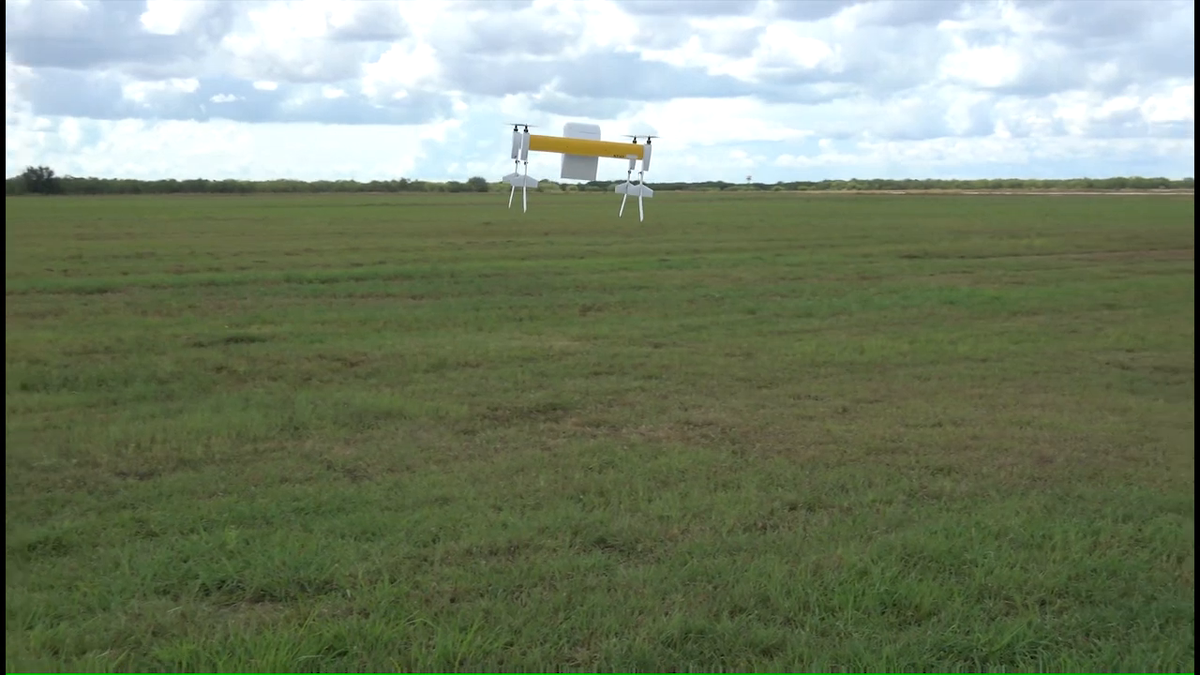
.css-cuqpxl:before{padding-right:0.3125rem;content:'//';display:inline;} Pop Mech Pro .css-xtujxj:before{padding-left:0.3125rem;content:'//';display:inline;}

He Was Frozen in a Shed for 30 Years. Can He Rise?

Why Everything We Know About Gravity May Be Wrong

The Navy is Fixing its Ship-Naming Mess
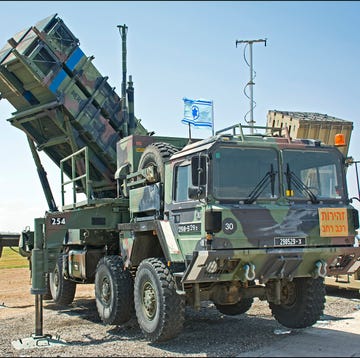
The U.S. May Buy Israeli Missiles for Ukraine

‘Stranded’ Astronauts Are Nothing New

Could Buried Treasure Unlock a Civil War Mystery?
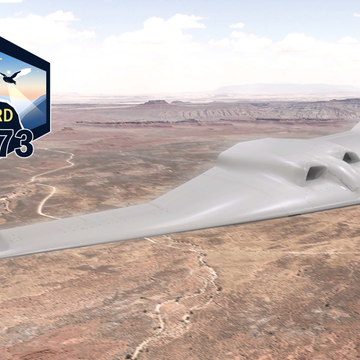
The Newest X-Plane is a Quiet, Stealthy Spy Plane

Tanks With Multiple Cannons Are Having a Moment
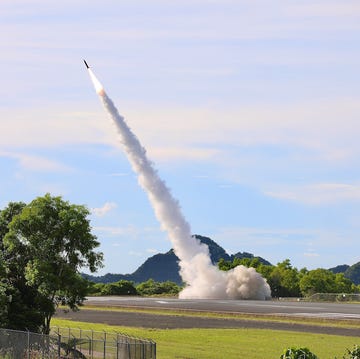
The Army is Back to Shooting at Enemy Warships

This Million-Dollar Heist Rocked the Art World

Work-Holding Hacks

IMAGES
VIDEO
COMMENTS
What does a Junior Researcher do? Researchers work in almost every industry and are hired to recognize patterns and locate, analyze, and interpret data. They work in fields including academia, science, medicine, finance, and other sectors. Their workload depends upon and is influenced by their research goals.
Human Factors Transportation Researcher. Virginia Tech. Blacksburg, VA. Typically responds within 1 day. $70,000 a year. Day shift. They may supervise junior level team members and student employees as assigned. The ideal candidate for this position is an experienced researcher capable of…. Just posted ·.
Eurodoc is a network of early-career researchers in Europe. This paper explains what Junior Researchers are, how they differ from other terms, and what challenges they face in their career development.
People who searched for junior researcher jobs in United States also searched for junior research fellow, junior research analyst, junior research associate, entry level research analyst, biology intern, quantitative researcher intern, research assistant intern, research analyst intern, data science intern. If you're getting few results, try a ...
Learn what a junior research fellowship is, how to get one and why it can benefit your academic and professional career. Follow six steps to prepare and submit your applications for competitive JRF programs in various fields.
As a Just Transitions Junior Researcher, you'll play a crucial role in supporting multi-year policy-influencing and ecosystem-building research projects. This role involves a mix of administrative and research tasks across various projects, ideal for someone with strong research skills, attention to detail, multitasking abilities, and the ...
Explore new Junior Researcher job openings and options for career transitions into related roles. Read more "Researcher" was the nearest match for you query "Junior Researcher". Steps to Become a Researcher If you enjoy making discoveries and finding obscure facts, consider a career as a researcher. To become a professional researcher, follow ...
Search Junior researcher jobs. Get the right Junior researcher job with company ratings & salaries. 1,199 open jobs for Junior researcher.
The Junior Professional Researcher Program is a two-year research and mentoring program that offers recent college graduates the opportunity to work as a full-time research associate for one or more faculty mentors. JPRs will engage in additional education and training activities, including taking courses through our summer programs ...
It typically takes 9-11 years to become a junior research scientist: Years 1-4: Obtaining a Bachelor's degree in a relevant field, such as biology, chemistry, or physics. Years 5-7: Pursuing a doctorate degree in a related field, which can take an additional 3-4 years. Years 8-9: Accumulating the necessary work experience, typically 2-4 years ...
Operations Research Analyst, Junior. Scientific Research Corporation. Saint Inigoes, MD. $61,300 - $102,150 a year. Easily apply. Performs research and analysis on a project to enhance the technical and economic development of the product and/or service. Posted 4 days ago ·.
As a Junior Research Analyst, your work is largely based on constant learning and improvement, and criticism or feedback often serves as the catalyst for that growth. Hiring managers ask this question to gauge your ability to handle critique without taking it personally, as well as to understand how you utilize feedback to refine your research ...
Learn how to become a Junior Researcher in BBC Learning from Rebecca's insights and explore the skills, qualifications and opportunities in this field.
4. I would classify a "junior" researcher as pretty much anyone who does not yet have a permanent position. (The question of whether a tenure-track faculty member is a "junior" researcher might be open, but anything "below" that is not, at least in my mind.) So yes, someone who has had a research stay abroad and has recently received a PhD is ...
The educational qualifications to become a junior analyst depend on the industry in which you work. The most straightforward way to enter this career is to earn a bachelor's degree in finance, business, or economics. Since you work with data, math-related degrees such as statistics may also qualify you for an entry-level role.
A Junior Research Fellowship (JRF), sometimes known as a Research Fellowship or Fellow by Examination, is a postdoctoral fellowship for early-career scholars and recent PhD / DPhil graduates at the University of Oxford and the University of Cambridge. JRFs are among the most highly competitive, prestigious postdoctoral fellowships in the United ...
NIMHANS Recruitment 2024 Apply for 1 Junior Research Fellow Vacancies in Bangalore - Karnataka location. National Institute of Mental Health and Neuro-Sciences Officials are recently published a job notification to fill up 1 Posts through Offline mode. All the eligible aspirants can check the NIMHANS career official website i.e., nimhans.ac ...
The NIH K12 award funds a national program to support the development of pediatric clinical pharmacology researchers and strengthen the community of clinical pharmacologist investigators engaged in pediatric clinical pharmacology research. Dr. Rose Gelineau-Morel is one of two who was funded through the first cohort of junior scholars within this program.
1,044 Junior research scientist jobs in United States. Spreader driver Trainee will receive $28.00 per hour. Spreader drivers will be paid for 30 minute prep and 30 minute clean up at spreader pay schedule level.…. The driver will receive $22.00 for loading, $22.00 for unloading, and $22 for the additional 2 hours of unloading time for a ...
EY is currently looking for a Data Analyst with Python knowledge and with a good French level - Junior to join our Tax Technology practice. Key Responsibilities Assist with importing, cleansing, and correcting accounting data to prepare it for analysis using Python/Pandas/Excel
The above hiring range represents the University's good faith and reasonable estimate of the range of possible compensation at the time of posting. Position Summary Reporting the Director and working with the research team, the Junior Programmer will provide support to the Healthcare Innovations Research and Evaluation...
Junior Research Fellow: 1 Post. Qualification: Post Graduate degree in Basic Science or Graduate/ Post Graduate Degree in professional course; Salary Details: As Per Norms; Age Limit: 30 years; Selection Process: Selection will be based on the Interview; How to Apply: Interested and eligible candidates send your CV with the supporting documents.Address: [email protected] on or before 16th July ...
The Junior Account Reference Data Analyst requires a good knowledge of the range of processes, procedures and systems to be used in carrying out assigned tasks and a basic understanding of the underlying concepts and principles upon which the job is based. Good understanding of how the team interacts with others in accomplishing the objectives ...
A residential and industrial region in the south-east of Mocsow. It was founded on the spot of two villages: Chagino (what is now the Moscow Oil Refinery) and Ryazantsevo (demolished in 1979). in 1960 the town was incorporated into the City of Moscow as a district. Population - 45,000 people (2002). The district is one of the most polluted residential areas in Moscow, due to the Moscow Oil ...
Welcome to the 628DirtRooster website where you can find video links to Randy McCaffrey's (AKA DirtRooster) YouTube videos, community support and other resources for the Hobby Beekeepers and the official 628DirtRooster online store where you can find 628DirtRooster hats and shirts, local Mississippi honey and whole lot more!
In this study, a junior high school biology teaching resource was modelled by 3DsMax software, designed and developed based on Unreal Engine 4 engine, in addition, a detailed teaching design was carried out by combining the structure of the BOPPPS teaching model, and the teaching resource developed in this study was applied to the classroom as ...
The estimated total pay for a Junior Researcher is $130,039 per year in the United States area, with an average salary of $86,386 per year. These numbers represent the median, which is the midpoint of the ranges from our proprietary Total Pay Estimate model and based on salaries collected from our users. The estimated additional pay is $43,653 ...
This story is a collaboration with Biography.com. Twenty-five years ago, the U.S. mourned the tragic death of John F. Kennedy Jr., who died with his wife, Carolyn Bessette Kennedy, and her sister ...
The city ice hockey team Kristall Elektrostal was established in 1949 and plays in the Junior Hockey League Division B. Notable people Nikolay Vtorov Street. Yevgeni Malkov, association football player; Anastasia Pozdniakova, Olympic diver; Vitali Proshkin, ice hockey player; Vladimir Zharkov, ice hockey player; Nikolay Vtorov, industrialist
generous vacation time, 401k match, and healthcare benefits. May 31, 2024. Current Manufacturing Technician in Melbourne, FL, Florida. Great place for a work / life balance! Search Junior user researcher jobs. Get the right Junior user researcher job with company ratings & salaries. 148 open jobs for Junior user researcher.